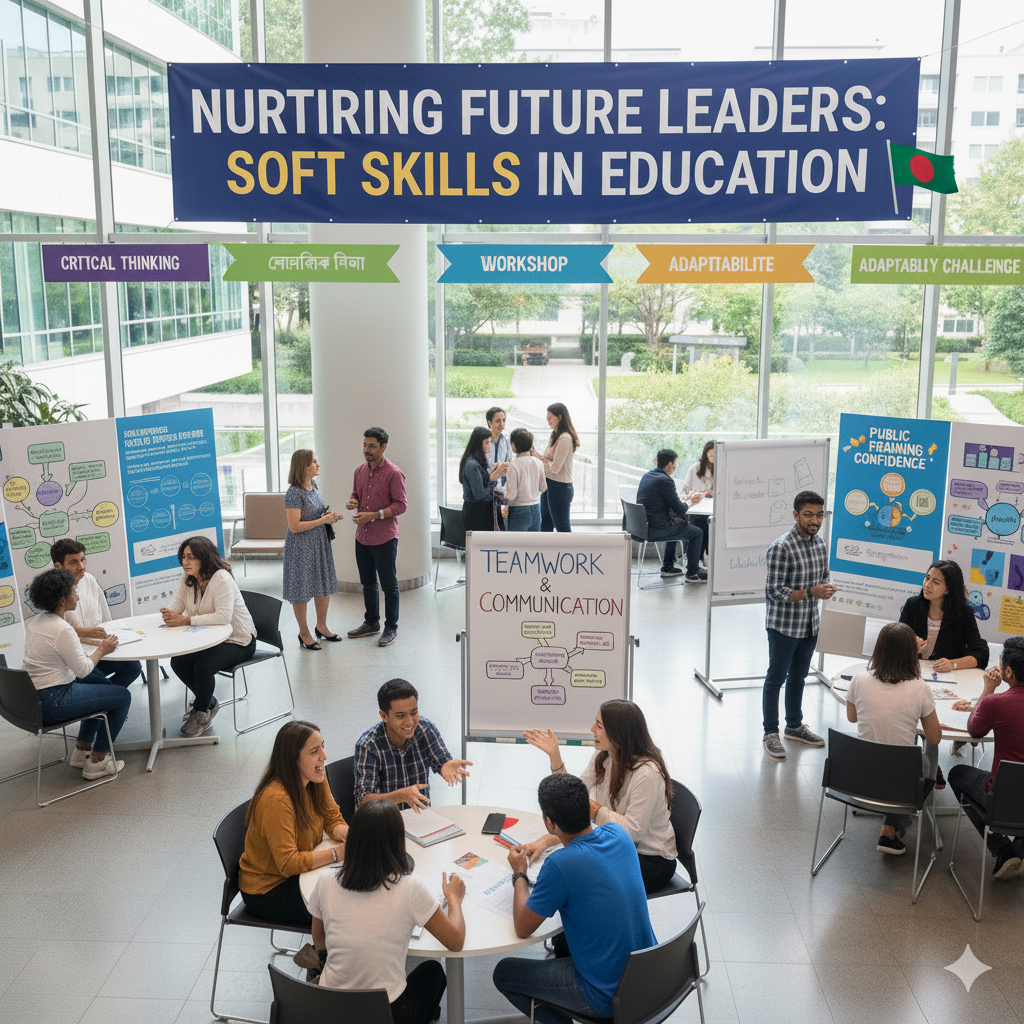Developing Soft Skills in Educational Institutions
Introduction
In the 21st century, success is no longer determined only by academic excellence or technical expertise. While hard skills—such as knowledge of mathematics, engineering, or computer programming—are crucial, they are not enough for long-term professional and personal growth. Employers today emphasize soft skills such as communication, leadership, teamwork, adaptability, and emotional intelligence. Educational institutions, therefore, play a vital role in nurturing these competencies alongside academic knowledge to prepare students for the demands of modern workplaces and society.

What are Soft Skills?
Soft skills are non-technical skills that influence how individuals interact with others and manage their work. They include communication, critical thinking, problem-solving, adaptability, leadership, teamwork, time management, empathy, and conflict resolution. Unlike hard skills, which can be taught through textbooks and measured through examinations, soft skills are developed gradually through experience, practice, and reflection.
Why Should Educational Institutions Focus on Soft Skills?
- Employability: Employers often state that graduates lack essential interpersonal and communication skills despite strong academic backgrounds.
- Adaptability to Change: In a world of rapid technological advancements, soft skills like creativity and problem-solving help students cope with uncertainty.
- Holistic Development: Education is not just about academic learning but also about preparing individuals to be responsible citizens and effective leaders.
- Career Advancement: Research shows that employees with strong soft skills are more likely to advance to leadership positions.
Strategies to Develop Soft Skills in Educational Institutions
1. Integrating Soft Skills into the Curriculum
- Courses should not focus solely on theory but include activities that encourage communication, teamwork, and problem-solving.
- Teachers can incorporate group projects, debates, case studies, and role-playing into lessons.
- Language and literature classes can emphasize presentation skills, public speaking, and persuasive communication.
2. Active and Experiential Learning
- Debates, seminars, and group discussions help students develop critical thinking and confidence in expressing ideas.
- Problem-Based Learning (PBL): Students work on real-world problems in teams, fostering creativity and collaboration.
- Simulations and role-plays allow practice in negotiation, leadership, and decision-making.
3. Extracurricular Activities and Clubs
- Student clubs, cultural programs, and sports encourage teamwork, leadership, and time management.
- Participation in drama, music, or debate clubs builds confidence and public speaking skills.
- Volunteering and community service cultivate empathy, social responsibility, and organizational skills.
4. Leadership Opportunities
- Student councils, prefect systems, and event management committees give students firsthand experience in leadership and conflict resolution.
- Rotating responsibilities in group tasks ensures that every student gets leadership exposure.
5. Workshops and Training Programs
- Institutions can organize regular workshops on topics such as emotional intelligence, stress management, communication, and negotiation skills.
- Career development centers can train students in resume writing, interview techniques, and workplace etiquette.
6. Use of Technology and Digital Tools
- Online platforms such as Google Meet, Zoom, or Microsoft Teams can be used for virtual teamwork projects.
- Digital storytelling, podcast creation, and video presentations enhance creativity and communication.
- Collaboration on digital platforms mirrors the remote work environment of modern organizations.
7. Internships and Industry Partnerships
- Practical exposure through internships helps students understand workplace expectations.
- Guest lectures by industry professionals provide insights into the importance of soft skills in careers.
- Mock interviews and assessment centers simulate real hiring processes, allowing students to practice.
8. Assessment and Feedback Mechanisms
- Traditional exams cannot measure soft skills. Instead, institutions should adopt behavioral assessments, peer reviews, and reflective journals.
- Teachers can use rubrics to evaluate group work, class participation, and presentations.
- 360-degree feedback (from peers, teachers, and mentors) can help students identify strengths and weaknesses.
9. Mentorship and Counseling
- Teachers and senior students can act as mentors, guiding juniors on personal development.
- Counseling sessions can address communication barriers, confidence issues, or teamwork challenges.
Challenges in Implementing Soft Skills Development
- Overloaded Curriculum: Teachers may feel pressured to focus only on academic content.
- Lack of Training: Educators themselves may require training in delivering soft skills education.
- Assessment Difficulties: Measuring qualities like empathy or adaptability is more complex than grading an exam.
- Student Engagement: Some students may undervalue soft skills compared to academic subjects.
Recommendations
- Educational boards should mandate soft skill modules alongside academic courses.
- Institutions should invest in faculty training to equip teachers with strategies for soft skill development.
- Collaboration between industry and academia can align education with workplace demands.
- Students should be given structured opportunities to practice soft skills in real-life contexts.
Conclusion
Soft skills are no longer optional—they are essential. Educational institutions must recognize their responsibility in preparing students not only for exams but also for life. By integrating soft skill development into curricula, promoting extracurricular engagement, and fostering real-world experiences, schools and universities can ensure that graduates are not just knowledgeable, but also capable, adaptable, and emotionally intelligent individuals. In a future where automation can handle many technical tasks, it is the human touch—empathy, leadership, communication, and creativity—that will make the difference.












